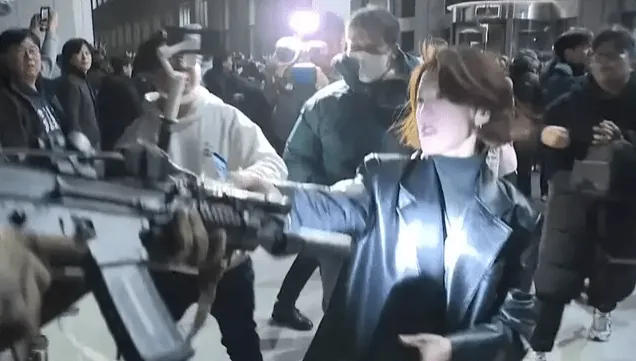
South Korean Opposition Spokesperson's Brave Stand Against Martial Law Sends Shockwaves Through Nation
2024-12-05
Author: Amelia
In a dramatic scene that captivated South Korea this week, a former TV anchor turned opposition spokesperson, Ahn Gwi-ryeong, made headlines by boldly confronting an armed soldier outside the National Assembly amidst a controversial martial law declaration.
The 35-year-old member of the opposition Democratic Party has quickly gone viral, hailed by many as a symbol of courage during a time of political turmoil. In what she describes as a spontaneous act driven by a sense of duty, Ahn insists her actions were not extraordinary, but rather a necessary response to what she viewed as a grave threat to democracy.
"I just needed to stop them," Ahn told reporters. "With people fighting against martial law troops, I felt compelled to act." Her intervention took place mere hours after President Yoon Suk Yeol announced martial law on national television—an announcement that shocked even members of his own party and triggered widespread public unrest.
As chaos unfolded, Ahn found herself at the forefront of a spontaneous resistance. Lawmakers quickly gathered to oppose the martial law decree, erecting barricades and forming human chains to prevent soldiers from entering the Assembly. Tensions escalated as aides sprayed fire extinguishers at the troops in a desperate attempt to protect the legislative process.
Reflecting on her moment in the spotlight, Ahn expressed humility, stating, "There were many people braver than me who stood up to the martial law troops." However, she also recognized the significance of her actions, underscoring that "If the troops had entered and disrupted the vote, we wouldn’t have been able to lift martial law."
The military personnel involved maintained a stance of restraint, with the commander issuing statements assuring the public that there was no intention to use firearms against civilians, and that no live ammunition was issued. The martial law lasted a mere six hours but left an indelible mark on the nation’s political landscape.
President Yoon justified the decree by alleging that it was essential to combat "anti-state" forces within the parliament, prompting immediate backlash from both opponents and allies alike. The declaration has led to protests across the nation, as citizens gather to voice their discontent against what they perceive as authoritarian tactics.
In response to the martial law, South Korea’s opposition parties have mobilized, formally submitting a motion to impeach President Yoon. While the outcome remains uncertain, support from lawmakers in his party is crucial for the impeachment to succeed. Ahn believes that public sentiment has already turned against Yoon, stating, “The people have already psychologically impeached him. Who can trust a president declaring martial law so cavalierly?”
Ahn's fierce stand and the events that followed have not only sparked national discourse on the state of democracy in South Korea but have also shed light on the potential for civil resistance amid political strife. As the opposition prepares to vote, South Korea teeters on the brink of a transformative political moment—one that will undoubtedly shape the future of governance in the country.
Stay tuned as this story develops, with the nation's eyes now fixed on the unfolding political drama and the monumental vote that could change everything.









 Brasil (PT)
Brasil (PT)
 Canada (EN)
Canada (EN)
 Chile (ES)
Chile (ES)
 España (ES)
España (ES)
 France (FR)
France (FR)
 Hong Kong (EN)
Hong Kong (EN)
 Italia (IT)
Italia (IT)
 日本 (JA)
日本 (JA)
 Magyarország (HU)
Magyarország (HU)
 Norge (NO)
Norge (NO)
 Polska (PL)
Polska (PL)
 Schweiz (DE)
Schweiz (DE)
 Singapore (EN)
Singapore (EN)
 Sverige (SV)
Sverige (SV)
 Suomi (FI)
Suomi (FI)
 Türkiye (TR)
Türkiye (TR)